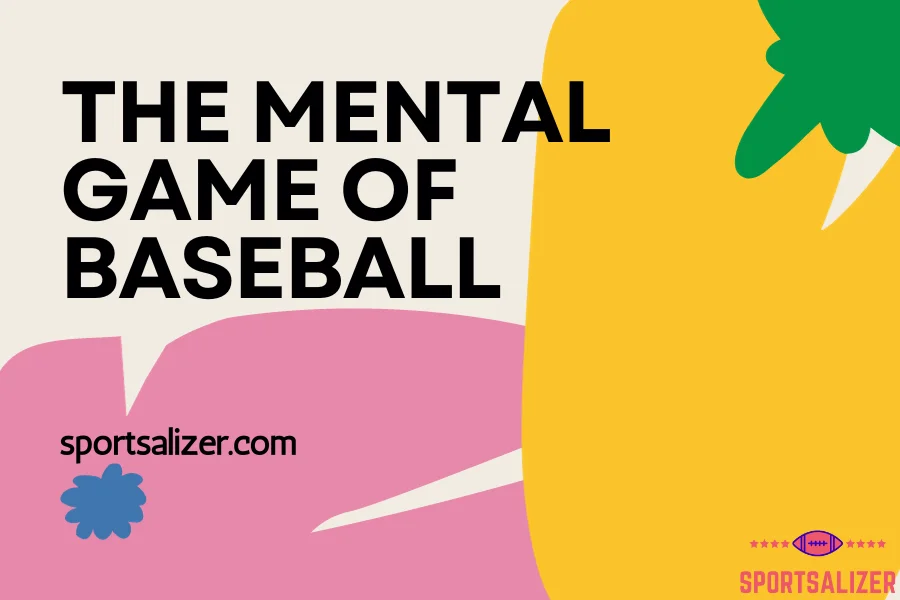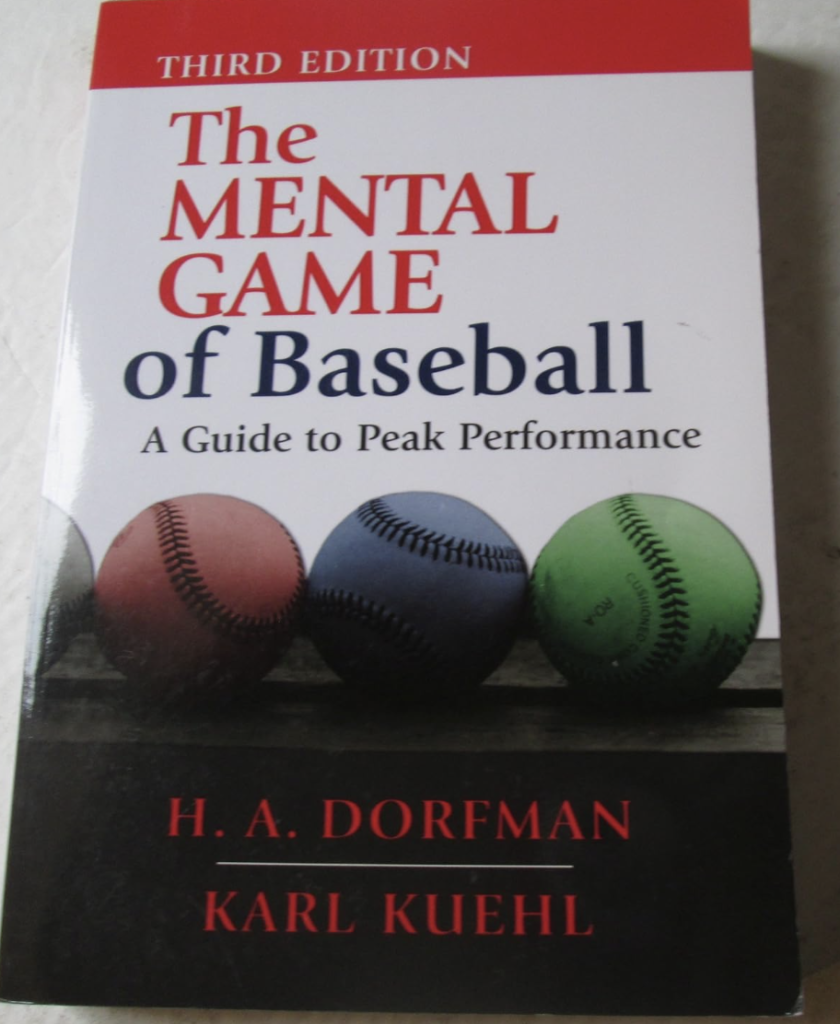The Mental Game of Baseball: Mastering the Mind for Peak Performance

Baseball is intellectually and physically demanding. The ability to stay focused, handle pressure, and make split-second decisions is vital for success on the field. This article explores the importance of the mental game in baseball and provides insights into how players can develop their mental toughness to achieve peak performance.
Contents
- 1 Understanding the Mental Game in Baseball
- 2 Developing Mental Toughness in Baseball
- 3 Mental Strategies for In-Game Situations
- 4 Seeking Professional Help and Support
- 5 Developing Mental Toughness in Baseball: Key Principles and Exercises
- 6 Overcoming Performance Anxiety in the Mental Game of Baseball
- 7 Visualization Techniques for Improving Baseball Performance
- 8 Building Confidence and Self-Belief in the Mental Game of Baseball
- 9 Focus and Concentration Strategies for Baseball Players
- 10 Handling Pressure Situations in the Mental Game of Baseball
- 11 Mental Preparation for Baseball Games: Pre-Game Rituals and Routines
- 12 Goal-Setting and Motivation in the Mental Game of Baseball
- 13 Recovering from Mistakes and Maintaining a Positive Mindset in Baseball
- 14 The Role of Mindfulness in the Mental Game of Baseball
- 15 Developing Resilience and Bouncing Back from Setbacks in Baseball
- 16 Mental Game Strategies for Handling Slumps in Baseball
- 17 Developing Mental Agility and Adaptability in the Game of Baseball
- 18 Strategies for Managing Distractions and Staying Present in Baseball
- 19 Emotional Control and Managing Frustration in the Mental Game of Baseball
- 20 Baseball Decision-Making Skills Improvement
- 21 Communication and Teamwork in the Mental Game of Baseball
- 22 Strategies for Staying Motivated and Focused During a Long Baseball Season
- 23 The Mental Game of Baseball for Youth Players: Teaching Mental Skills Early
- 24 FAQs
- 25 Conclusion
- 26 Trending Articles
Understanding the Mental Game in Baseball
- The Psychological Aspect: Baseball is a game of strategy, where players need to anticipate the actions of their opponents, make quick decisions, and adjust their approach accordingly. The mental game involves understanding the psychology of the sport, including pitch recognition, situational awareness, and maintaining composure under pressure.
- Confidence and Belief: Confidence is key in baseball. Believing in one’s abilities, trusting the training and preparation, and having a positive mindset are crucial factors that can significantly impact performance on the field.
- Focus and Concentration: Baseball requires unwavering focus and concentration. From the pitcher analyzing the batter’s tendencies to the batter tracking the ball and the fielders staying alert, maintaining focus throughout the game is essential for making precise plays and seizing opportunities.
Developing Mental Toughness in Baseball
- Visualization and Mental Imagery: Visualization techniques help players mentally rehearse different scenarios, picturing themselves executing successful plays. By visualizing success, players can enhance their confidence, improve muscle memory, and develop a strong mental connection between their thoughts and actions on the field.
- Positive Self-Talk: It is impossible to overstate how powerful it is to have a constructive dialogue with oneself. Encouraging and uplifting self-talk helps players maintain a resilient mindset, overcome setbacks, and stay motivated. Replacing negative thoughts with positive affirmations can enhance confidence and boost overall performance.
- Embracing Pressure and Handling Failure: Baseball is a game of highs and lows. Learning to embrace pressure and thrive in high-stakes situations is a hallmark of mentally tough players. Additionally, understanding that failure is a part of the game and using it as a learning opportunity rather than dwelling on mistakes can lead to growth and improved performance.
- Routine and Mental Preparation: Establishing pre-game routines and mental preparation rituals can help players get in the right mindset before stepping onto the field. These routines provide structure, promote focus, and signal to the brain that it’s time to shift into game mode.
Mental Strategies for In-Game Situations

- Staying Present and Mindful: Baseball is often referred to as a “game of inches.” It is essential to maintain one’s presence in the here and now and to be completely involved in each play. Techniques from the field of mindfulness, like taking long, slow breaths or concentrating on the activity at hand, may assist players in maintaining their attention and making sound judgments.
- Managing Pressure Situations: The way a player performs under pressure may either make or ruin their career. When the stakes are high, it may be helpful for players to develop strategies to handle pressure, such as exercises that include deep breathing, positive self-talk, and visualization of good outcomes. These strategies can help players remain cool and perform at their best.
- Adapting to Changing Game Conditions: Baseball is dynamic, with game conditions shifting from inning to inning. The capacity to think creatively and swiftly shift tactics will be crucial for surviving these shifts. Success requires an open mind, the ability to assess the situation objectively, and the confidence to act accordingly.
Seeking Professional Help and Support
- Sports Psychology Professionals: Many players, at both amateur and professional levels, seek the assistance of sports psychology professionals. These experts specialize in mental performance coaching, helping athletes develop mental resilience, overcome mental blocks, and optimize their overall mental game.
- Teammate and Coach Support: Building a supportive team environment is crucial for mental well-being in baseball. Teammates and coaches can provide encouragement, offer feedback, and serve as valuable sources of support during both triumphs and challenges.
Developing Mental Toughness in Baseball: Key Principles and Exercises
Mental toughness is the ability to maintain focus, resilience, and composure in challenging situations. It is essential for baseball players to develop mental toughness to overcome obstacles and perform at their best. Key principles for developing mental toughness include embracing adversity, setting realistic goals, and maintaining a positive mindset. Mental toughness may be developed by activities like visualization, positive self-talk, and regulated breathing.
Overcoming Performance Anxiety in the Mental Game of Baseball
Performance anxiety can hinder a baseball player’s performance. Techniques like relaxation exercises, pre-performance routines, and reframing negative thoughts can help athletes overcome anxiety. Building confidence through consistent practice and positive reinforcement can also alleviate performance anxiety.
Visualization Techniques for Improving Baseball Performance
Visualization involves mentally rehearsing and imagining successful plays and scenarios. By vividly picturing themselves executing precise movements and making successful plays, baseball players can improve muscle memory, boost confidence, and enhance focus and concentration on the field.
Building Confidence and Self-Belief in the Mental Game of Baseball
Confidence is a critical factor in baseball success. Players may boost their self-assurance by concentrating on their abilities, establishing objectives that are within their reach, and keeping a good attitude. Additionally, recalling past successes and receiving constructive feedback can help enhance self-belief.
Focus and Concentration Strategies for Baseball Players
Maintaining focus and concentration is vital during a baseball game. Strategies such as setting specific goals, using cue words or phrases, and staying in the present moment can help players remain focused and attentive. Enhancing one’s ability to concentrate may also be accomplished by removing any potential distractions and creating a ritual to follow before a performance.
Handling Pressure Situations in the Mental Game of Baseball
Pressure situations are common in baseball, and the ability to perform under pressure is crucial. Players may assist themselves in maintaining composure and concentration in high-pressure situations by using techniques like deep breathing, positive self-talk, and mental visualization. Breaking down the game into smaller, manageable tasks can also alleviate pressure.
Mental Preparation for Baseball Games: Pre-Game Rituals and Routines
Establishing pre-game rituals and routines can help baseball players mentally prepare for games. These rituals create a sense of familiarity and help players enter a focused and optimal mindset. Examples include warm-up exercises, visualization, and listening to specific music.
Goal-Setting and Motivation in the Mental Game of Baseball
Setting goals provides direction and motivation for baseball players. Goals should be SMART. Players keep motivated, assess progress, and concentrate by establishing short-term and long-term objectives.
Recovering from Mistakes and Maintaining a Positive Mindset in Baseball
Mistakes are inevitable in baseball, but how players respond to them is crucial. Developing resilience and maintaining a positive mindset can help players bounce back from errors. Recovering from errors is made easier by using strategies such as re-framing negative ideas, concentrating on the here and now, and cultivating a compassionate attitude towards oneself.
The Role of Mindfulness in the Mental Game of Baseball
The practice of mindfulness entails paying attention to and being completely present in the here and now without passing judgment on anything that is experienced. Practicing mindfulness can enhance focus, reduce stress, and improve decision-making skills in baseball. Techniques like mindful breathing, body scans, and sensory awareness exercises can be incorporated into daily routines.
Developing Resilience and Bouncing Back from Setbacks in Baseball
Resilience is the ability to adapt and recover from setbacks. Baseball players can develop resilience by learning from failures, maintaining a growth mindset, and seeking support from coaches and teammates. Another way to boost one’s resilience is to place more importance on the journey itself rather than only the destination.
Mental Game Strategies for Handling Slumps in Baseball
Slumps are common in baseball and can be mentally challenging. Strategies for handling slumps include maintaining a positive attitude, focusing on the fundamentals, seeking feedback, and adjusting strategies if necessary. Setting small goals and visualizing success can also help players overcome slumps.
Developing Mental Agility and Adaptability in the Game of Baseball
Baseball is a dynamic game that requires mental agility and adaptability. Players must adapt to shifting conditions. Flexibility, open-mindedness, and decision-making speed are crucial.
Strategies for Managing Distractions and Staying Present in Baseball
Baseball games can be filled with distractions, both internal and external. Players can manage distractions by maintaining focus on the task at hand, utilizing visualization techniques, and using cue words or phrases to redirect attention. Developing self-awareness and practicing concentration exercises can also aid in staying present.
Emotional Control and Managing Frustration in the Mental Game of Baseball
Controlling emotions and managing frustration is crucial for baseball players. Deep breathing, visualization, and self-regulation may help players remain calm and sensible. Developing emotional intelligence and seeking support from coaches and teammates can also contribute to emotional control.
Baseball Decision-Making Skills Improvement
The sport of baseball forces players to make decisions on the fly. Improving decision-making skills involves studying game situations, analyzing opponents’ tendencies, and practicing situational awareness. Players can enhance their decision-making by simulating game scenarios during practice and seeking feedback from coaches.
Communication and Teamwork in the Mental Game of Baseball
Effective communication and teamwork are essential in baseball. Players should develop strong communication skills to coordinate plays, provide support, and enhance team cohesion. Active listening, clear and concise communication, and fostering a positive team culture contribute to successful teamwork.
Strategies for Staying Motivated and Focused During a Long Baseball Season
A long baseball season can present challenges in maintaining motivation and focus. Setting short-term goals, varying training routines, and incorporating enjoyable activities can help players stay motivated. Managing physical and mental fatigue through adequate rest and recovery is also crucial for maintaining focus throughout the season.
The Mental Game of Baseball for Youth Players: Teaching Mental Skills Early
Introducing mental skills early in youth baseball can lay the foundation for future success. Coaches and parents can teach young players techniques such as goal-setting, visualization, positive self-talk, and emotional control. Creating a supportive and positive learning environment fosters the development of strong mental skills in young athletes.
FAQs
Why is the mental game important in baseball?
The mental game is crucial in baseball because it directly impacts performance on the field. Baseball requires split-second decision-making, focus, and the ability to handle pressure. The mental aspect of the game determines how well players can analyze situations, stay composed under stress, and maintain a positive mindset, all of which can significantly impact their overall performance.
Can mental toughness be developed in baseball?
Yes, mental toughness can be developed in baseball. Just like physical skills, mental toughness is a skill that can be cultivated through practice, training, and the implementation of specific techniques. Players can work on visualization, positive self-talk, embracing pressure, and developing routines to enhance their mental toughness over time.
How exactly can the practice of visualization contribute to the mental aspect of the game of baseball?
In the mental game of baseball, visualization is a strong weapon that you may use. By mentally rehearsing successful plays and envisioning positive outcomes, players can enhance their confidence, improve muscle memory, and strengthen the connection between their thoughts and actions on the field. Visualization prepares athletes to make rapid judgments and execute moves.
How do players handle pressure situations in baseball?
Handling pressure situations in baseball requires mental resilience and effective strategies. Players can manage pressure by implementing techniques such as deep breathing exercises to stay calm, positive self-talk to boost confidence, and visualization of successful outcomes to maintain a focused mindset. Adapting to pressure situations with a calm and composed demeanor is essential for peak performance.
Can seeking professional help benefit a player’s mental game in baseball?
Yes, seeking professional help, particularly from sports psychology professionals, can greatly benefit a player’s mental game in baseball. Sports psychology professionals specialize in mental performance coaching and can provide tailored strategies to enhance mental toughness, overcome mental blocks, and optimize overall performance. Their expertise and guidance can help players develop a strong mental foundation, leading to improved focus, confidence, and success on the field.
Conclusion
In the game of baseball, the mental aspect is just as important as physical skills. Developing mental toughness, confidence, focus, and the ability to handle pressure are critical components of achieving peak performance on the field. By understanding the psychological aspects of the game, implementing mental strategies, and seeking professional support when needed, players can enhance their mental game and unlock their full potential in the sport they love. Mastering the mental game of baseball is not only a key to success on the field but also a valuable skill that can be applied in other areas of life.










